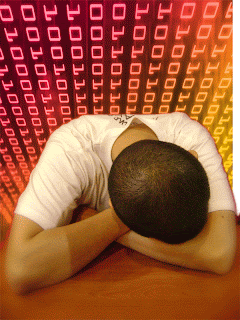The Importance of Being Senseless
 What makes getting up in the morning so difficult sometimes? I've just spent ten minutes wrestling with my volition, although in this case it's been time well spent as I was deliberately analysing what it was that made me want to stay in bed.
What makes getting up in the morning so difficult sometimes? I've just spent ten minutes wrestling with my volition, although in this case it's been time well spent as I was deliberately analysing what it was that made me want to stay in bed.Apparently it's not physical tiredness (and if I was writing a Wikipedia article I'd have to "cite" something here). All the physical body needs to recharge its batteries is around half an hour's lying down and then it's good to go. No, it's the brain. It's always the brain.
Lying there analysing why I didn't want to get up I noticed there was a mental glow in the back brain and a general low level endorphine buzz throughout the body. I was enjoying it enough to be physically conscious of the Happy Mechanism. Usually the Happy Mechanism kicks in when we're doing something that we oughta, so what was it about lying there in bed and possibly falling asleep again that was biologically better for me than getting up, writing this, getting ready, eating breakfast, going to work and earning a crust? Would Thugg the Caveman have felt the same, preferring to stay wrapped up under his badly-skinned bear pelt than going out after yet more of those sabre-toothed tigers?
Sleep is obviously very important. It's a shame that we don't really understand what it's for. A Thugg-based story will be no help in this instance as sleep is far older than mankind. All mammals and birds sleep (although I can't see how whales and dolphins manage to get much). The dinosaurs probably slept.
I wouldn't be surprised to discover that if deprived of sleep for long enough you'd drop dead.
Like many biological processes we have to ask What was it originally for? and What does it do now? I have no idea - this is a topic for which a major amount of research would be required and I only realised I'd be writing this whilst engaged in the activity described at the beginning of this piece. In this epoch, human sleep must be something to do with growth and development, which would explain why children need more sleep than adults.
However, despite the inscrutibility of sleep's purpose, the effects of being deprived of it may well give us a meaty clue as to the purpose of this mysterious activity without which, lets face it, we'd have so much more time.
Generally, when deprived of sleep you become increasingly less and less efficient at cognitive activity. You start to make mistakes and get irritable. You forget what you're doing and become clumsy. But why? Something important is missing (and I don't mean sleep, that would be a circular argument).
Then, after a couple of days without shuteye, it happens. You start hallucinating.
I'm writing from experience here; the same occasion when after 48+ hours of sleeplessness I found myself experiencing the spectacularly useless supernatural power of Vehicle Pillar Prediction. As we have discussed before, hallucinations, like dreams, are caused by The Question Machine (QM), the mechanism by which we make sense of the universe around us, running at a very low threshold with subsequently very bad results, for example
Q: What are those moving shapes?
A: An endless row of 1 foot high old ladies crossing the road.
So taking the QM offline for maintenance is essential - and if we refuse to go to sleep the brain does it anyway. Furthermore it would seem that we don't turn the QM down to make sure that we dream, but more that dreams are an unavoidable side effect of having the QM idling or switched off.
Why do we need it switched off? I assume to have new recognition patterns installed. Every day we experience new things and these will have to be programmed into the game of Twenty Million Questions we play whenever we look at something, whenever we experience something. If they weren't we'd never move forward in our lives and would become obsolete.
Essentially we go offline every night in order for our BrainOS to receive critical software updates.



Comments